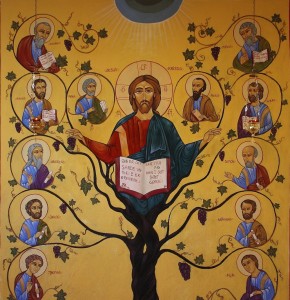Much like the calling of the four fishermen,[1] Jesus calls Matthew. He does not, however, promise to make Matthew a “fisher of men”. This doesn’t mean Matthew is being called to a lesser Apostleship; it means that the fishing imagery, which would have been meaningful to Peter, Andrew, James, and John, doesn’t make as much sense when applied to a tax collector. Matthew, like the four fishermen, seemingly abandons his profession without any second thought or hesitation. This is not, however, the first Matthew has ever heard of Jesus. Being a follower of John the Baptist, Matthew knew, as the four fishermen did, that Jesus was the Messiah. Matthew heard John the Baptist preach that tax collectors, such as himself, should collect no more than what is appointed for,[2] and that Jesus was the Lamb of God who takes away the sin of the world. He, having heard the proclamation of God’s Word, contrite in front of the mirror of the Law, responded in faith when Jesus called Matthew into His direct service.
Jesus accompanies Matthew to his home. Matthew has a feast to which those other associates of his are invited, along with Jesus’ other disciples. Knowing that Jesus is the One promised to redeem Israel, it is only natural that Matthew would want to deliver that good news to those into whose midst God had placed him, by virtue of his vocation. No doubt Matthew had little difficulty filling his table with people. By this time, Jesus had done miracles, and preached and taught publicly. Jesus’ notoriety had spread. Most recently, Jesus had forgiven the sins of, and physically healed, a paralyzed man.[3] The multitudes following Jesus saw this, but so did The Jews – the Scribes, the Pharisees, the Sadducees, and the Teachers of the Law. By healing the paralytic, Jesus demonstrated to the Jews that He had the authority to forgive sins, something only God could do. But the very people who should’ve recognized the Messiah did not receive Him.[4] They were seeking to justify themselves by their keeping of the Law. The Jews, therefore, began looking for any type of scandal they could use to discredit Him in the eyes of the people. Associating with tax collectors, collaborating Jews who served the hated Roman government, certainly qualified as such a scandal.
The first part of Jesus’ reply to the Pharisees seems obvious. Of course a healthy person doesn’t need to be treated by a physician. Jesus is saying that those to whom He has come are sick, and He is the physician. This is most certainly true, and Jesus is indeed saying that those tax collectors and sinners are, well… sinners. The Jews, however, misunderstand Him; they recognize that the people with whom Jesus was eating were sinners, but they think they are excluded from that group. They think they are ok because of their righteous keeping of the Law. Jesus, however, came to heal all people of their terminal disease of sin, Jew and Gentile, Pharisee or tax collector. Jesus, who is Israel reduced down to one, creates a new, perfect Israel in Himself. He is the vine;[5] His Father, the Vinedresser, grafts wild olive shoots called Gentiles into Jesus; He takes the branches that were broken off, the unbelieving Jews, and grafts them into the vine again as well.[6] He unites us sinners to His death and resurrection, by His grace, through faith in Him. He creates that faith in men through His Word - proclaimed, or connected with the physical elements of water in baptism, or bread and wine by which He gives us His body and blood to eat and drink in the Lord’s Supper: Or do you not know that as many of us as were baptized into Christ Jesus were baptized into His death?[7] But when the kindness and the love of God our Savior toward man appeared, not by works of righteousness which we have done, but according to His mercy He saved us, through the washing of regeneration and renewing of the Holy Spirit, whom He poured out on us abundantly through Jesus Christ our Savior, that having been justified by His grace we should become heirs according to the hope of eternal life.[8]
Jesus quotes the prophet Hosea in response to the Pharisees: O Ephraim, what shall I do to you? O Judah, what shall I do to you? For your faithfulness is like a morning cloud, and like the early dew it goes away. Therefore I have hewn them by the prophets, I have slain them by the words of My mouth; and your judgments are like light that goes forth. For I desire mercy and not sacrifice, and the knowledge of God more than burnt offerings.[9] Jesus tells the Pharisees that their faith has disappeared like the early dew. It has evaporated. They trust in their works to make them acceptable to God. He has slain them by the words from His mouth. His proclamation of the Law exposes their sin, and that of all men; it kills them, and calls them to repentance. Jesus desires them to believe, to have faith, to be healed, rather than for them to keep every minute regulation of the Law by the outward act. He wants them, and all men, to recognize their illness and come to the only Physician who can cure it. Only after faith in Jesus is kindled within the heart by the working of the Holy Spirit through the Word, will we strive to obey God’s Law out of gratitude. We sinful human beings, like the tax collectors, like the Pharisees, like all men born since the Fall, are sick with the disease of sin which leads to death. Only the Great Physician has the cure – His own body and blood, given and shed for the remission of sins.
